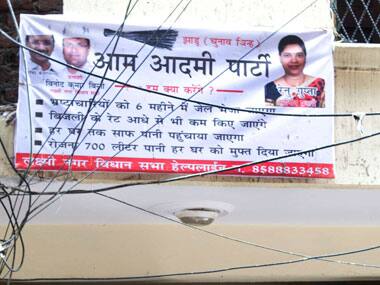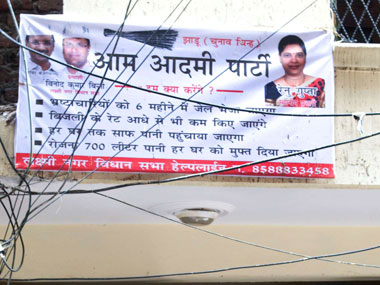To make a mark in politics, you need more than just good intentions. You need money, preferably liquid cash. Politics is business. It didn’t take long for even the self-righteous Arvind Kejriwal to recognise this. Unfortunately, the reality is harsh. Success comes with its share of trouble. Had Kejriwal’s party remained truly aam, no one would have bothered investigating his funding sources. That both the Congress and BJP are pouncing to discover any sign of dodgy contributions in Aam Aadmi Party’s Rs 20 crore corpus is actually a tribute to Kejriwal. And the attack on AAP’s funding certainly isn’t going to change Delhi’s electoral calculus. It is plain obvious to the average Delhi voter that both the mainstream parties have much more money in their coffers than Kejriwal has, and likely from far more dubious sources. [caption id=“attachment_1086689” align=“alignleft” width=“380”]
 The banner announcing Mishra as the AAP point person: Naresh Sharma/Firstpost[/caption] The stick being used to beat Kejriwal is the Foreign Contributions Regulation Act (FCRA), which ostensibly empowers the Government to monitor and regulate the entry of foreign funds to non-profit institutions in India (including political parties). In practice, it is used mostly to harass inconvenient NGOs and political parties rather than to curb apparently anti-national activities funded by foreigners which is its mandate. Frankly, what is the big deal if a US national (of Indian origin) donates Rs 5 lakh (or indeed Rs 50 lakh) to AAP? It may technically fall foul of some clause in the FCRA but is it compromising national interest? The application of FCRA to Kejriwal’s party is particularly bizarre because the Congress and BJP have received funding from multinational corporations like Vedanta (according to research by the prominent NGO, Association for Democratic Reforms). If mindless application of a problematic law is the chosen path, then why aren’t the Congress and BJP also being investigated? Needless to say, there is no reason why the Congress and BJP should not accept funds from corporates, Indian or foreign or individuals, Indian or foreign. It is the accepted practice in most functioning democracies across the world. The point is not so much about the sources of funding. That is actually a convenient red herring being peddled by the UPA. The real point is about disclosure. That is where the Indian system falls woefully short. Election law should make it mandatory for all political parties to disclose every detail about the funding they receive, whether the amount is Rs 1 or Rs 1 crore. Punishment should be reserved for not disclosing information. Once sources of funding are disclosed, it is up to voters (with help from NGOs like ADR) to judge the antecedents of donors. Transparency would also make it harder for parties, should they be elected to govern, to grant special favours to those corporates, foreigners or local individuals who gave them large donations? The conflict of interest would be public and subject to scrutiny by investigating agencies, courts and voters. It is wishful thinking to believe that private sector (whether individuals or corporates) funding of elections can be eliminated from politics. It will not happen. But democracy and government will continue to be ill-served as long as the concept of disclosure is brushed under the carpet.
The banner announcing Mishra as the AAP point person: Naresh Sharma/Firstpost[/caption] The stick being used to beat Kejriwal is the Foreign Contributions Regulation Act (FCRA), which ostensibly empowers the Government to monitor and regulate the entry of foreign funds to non-profit institutions in India (including political parties). In practice, it is used mostly to harass inconvenient NGOs and political parties rather than to curb apparently anti-national activities funded by foreigners which is its mandate. Frankly, what is the big deal if a US national (of Indian origin) donates Rs 5 lakh (or indeed Rs 50 lakh) to AAP? It may technically fall foul of some clause in the FCRA but is it compromising national interest? The application of FCRA to Kejriwal’s party is particularly bizarre because the Congress and BJP have received funding from multinational corporations like Vedanta (according to research by the prominent NGO, Association for Democratic Reforms). If mindless application of a problematic law is the chosen path, then why aren’t the Congress and BJP also being investigated? Needless to say, there is no reason why the Congress and BJP should not accept funds from corporates, Indian or foreign or individuals, Indian or foreign. It is the accepted practice in most functioning democracies across the world. The point is not so much about the sources of funding. That is actually a convenient red herring being peddled by the UPA. The real point is about disclosure. That is where the Indian system falls woefully short. Election law should make it mandatory for all political parties to disclose every detail about the funding they receive, whether the amount is Rs 1 or Rs 1 crore. Punishment should be reserved for not disclosing information. Once sources of funding are disclosed, it is up to voters (with help from NGOs like ADR) to judge the antecedents of donors. Transparency would also make it harder for parties, should they be elected to govern, to grant special favours to those corporates, foreigners or local individuals who gave them large donations? The conflict of interest would be public and subject to scrutiny by investigating agencies, courts and voters. It is wishful thinking to believe that private sector (whether individuals or corporates) funding of elections can be eliminated from politics. It will not happen. But democracy and government will continue to be ill-served as long as the concept of disclosure is brushed under the carpet.
Why the application of FCRA to Kejriwal's AAP is bizarre
Dhiraj Nayyar
• November 13, 2013, 11:49:38 IST
It is wishful thinking to believe that private sector (whether individuals or corporates) funding of elections can be eliminated from politics. It will not happen. But democracy and government will continue to be ill-served as long as the concept of disclosure is brushed under the carpet.
Advertisement
)
End of Article